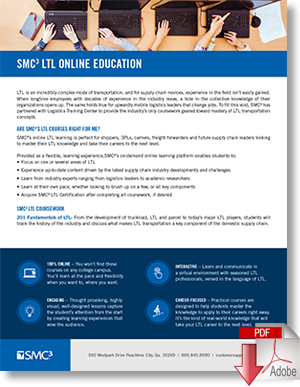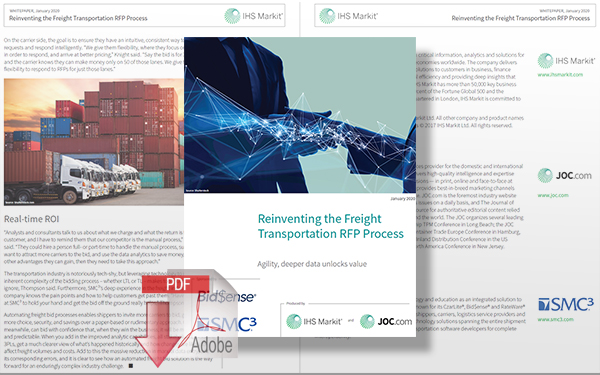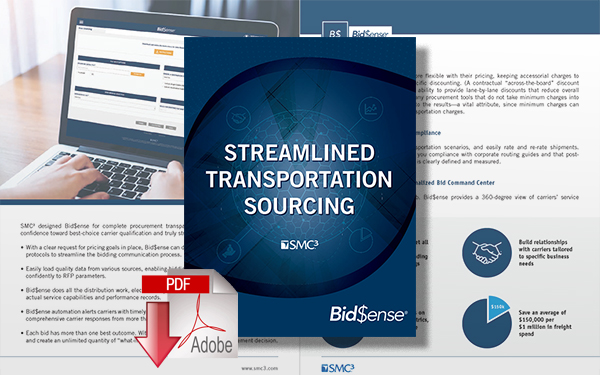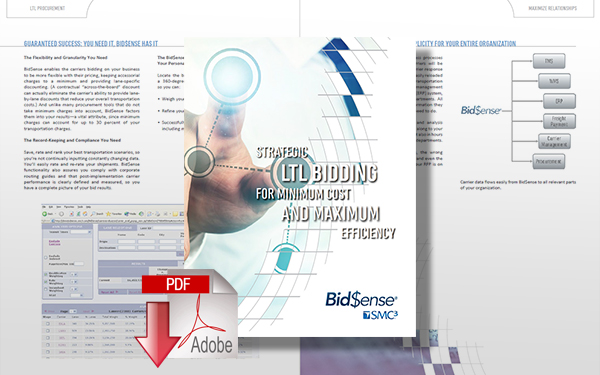Final-Mile Logistics Companies Embrace Technology during COVID-19 Pandemic

Jason G Burns, president of New Orleans-based QCS Logistics, sat down with SMC3 to explore the current state of the final-mile industry and the pandemic’s impact on trucking.
The Final-Mile and the Pandemic’s Impact on Trucking
Starting July 15, SMC³’s exclusive summer version of its Less-than-Truckload (LTL) fundamentals course will teach attendees the ins and outs of LTL alongside live presentations from industry experts.
As part of an exclusive one-time offer, register for the supply chain education class before the 15th to receive a 25-percent discount off registration.
SMC³ recently spoke with one of those industry experts to get a preview of what students will learn from his seminar.
Jason G. Burns, president of New Orleans-based QCS Logistics (pictured above), sat down with us to explore the current state of the final-mile industry and the pandemic’s impact on the trucking industry.
Other than the lasting effects of the pandemic, what are the two biggest challenges on the horizon for last-mile companies?
As a result of the continued growth of e-commerce, especially during the coronavirus pandemic, the final-mile industry has emerged as a critical component of a shipper’s supply chain.
However, many final-mile companies operate within much smaller geographical markets than traditional carriers and do not have the technology that enables them to meet the increasing demands from the digitization of freight.
Shippers are eager to leverage the capacity of the final-mile industry, yet a fragmented network of providers and unscalable technology are two challenges that must be overcome.
So are there technology tools that will allow companies to overcome these challenges?
Most final-mile companies utilize third-party dispatch systems to manage their day-to-day operations.
These systems cover the primary processes of order entry, dispatch, mobile apps (for drivers), and accounting/reporting.
However, only a few offer the ability to interface via API; even then, large shippers are reluctant to invest the time and resources to integrate with an individual carrier who is unproven.
To overcome this challenge, there are a handful of businesses that offer final-mile companies the ability to work with large shippers through their API-based, digital freight matching platforms.
These companies, such as my startup InPacity, operate as marketplaces by developing custom APIs to help shippers achieve data management/scalability needs.
InPacity simultaneously interfaces with final-mile providers that can now access thousands of shipments that would otherwise be unavailable to them.
Has the coronavirus pandemic sped up the adoption of proven technologies in the supply chain arena?
I think the jury is still out on this question; however, all the signs point to final-mile carriers continuing to seek out technologies that will increase operational efficiency and improve the bottom line.
How has the pandemic changed final-mile shipping? Are these changes permanent?
The final-mile industry, like other essential businesses, has had to navigate the ever-changing environment of operating safely during a pandemic.
Keeping our frontline workers safe with PPE; developing protocols and procedures to mitigate risks and immediately respond when an employee tests positive, and managing growth has forced industry leaders to make changes to their internal operations.
The two biggest changes that I believe will be permanent are managing our businesses in a majority virtual office environment and using visual proof of deliveries versus a customer signature.
Traditionally, final-mile offices operate with a lot of direct communication and manual processes that relied upon paper being pushed from order entry to billing reconciliation.
As a result of COVID-19, we’ve had to quickly learn how to leverage technologies to not only communicate in a virtual workplace but also streamline internal procedures using more electronic data files than paper.
To maintain social distancing guidelines, drivers can no longer obtain a signature from the consignee. The remedy was to utilize new technology on our mobile apps to photograph the items being delivered at the final destination.
Is it more necessary than ever for supply chain stakeholders to create mutually beneficial, innovative partnerships?
Absolutely. As the economy continues to rebound, there will be more opportunities available to final-mile providers.
However, in order to best take advantage, companies must be well-positioned with technology and operational expertise to offer a competitive solution.
The reality is that there is only a small percentage of final-mile companies currently ready for the volume of business that will be available over the next 3-5 years.
Partnerships with technology firms or larger, regional carriers will reduce costly investments in resources. These collaborations will be pivotal to future success.
Is there any way for the last-mile industry to prepare for the next major disruption?
I believe it comes down to which leaders have the ability to view disruption as an opportunity versus an excuse for poor results.
One of the keys to success for final-mile companies that have navigated this pandemic is to have data-driven dashboards with daily updates on all aspects of the business.
To quote the great Wayne Gretzky, tools like this enable leaders “to skate to where the puck is going” so they quickly adapt and overcome any disruption the future may hold.
Spend the summer learning about the intricacies of LTL with SMC³
Sign up by July 15 for a 25-percent discount off the registration fee. Register for the exclusive supply chain education offering today!
Related Article: C.H. Robinson Executive Talks Pandemic Challenges and Evolving Supply Chain Technologies
Related Papers
Reinventing the Freight Transportation RFP Process
In this white paper, we describe how using a tech-enabled freight bid system allows for more freight providers to be considered, greatly improving choice and the ability to tailor your service around more than just price. Download Now!
Bid$ense: Streamlined Transportation Sourcing
This paper details how using Bid$ense leverages SMC³’s lifetime of transportation purchasing knowledge, allowing customers to incorporate pricing, claims ratios, on-time performance and transit times into their LTL bidding analysis. Download Now!
Strategic LTL Bidding for Minimum Cost & Maximum Efficiency
This paper details how SMC³ designed Bid$ense for complete procurement transparency, and how you’ll move ahead with ease and confidence toward best-choice carrier qualification and truly strategic LTL procurement. Download Now!
More SMC³ Resources
Article Topics
SMC3 News & Resources
Mastering LTL Shipping: Strategies to Become the Carrier’s Top Choice Career Success in LTL: Insights from Industry Veterans Effective Strategies for Last Mile Returns in LTL Logistics SMC3 Mercury Gate Case Study - Improving Workflows and Enhancing Efficiency with LTL APIs SMC3: Is Technology a Competitive Advantage in the Modern Supply Chain Industry? Armada’s Prather examines the disconnect between the freight economy and the macro economy at SMC3 JumpStart 2024 SMC³’s Solution to the Logistics Industries Talent Problem More SMC3Latest in Transportation
Trucking Industry Pushes Back on Government’s Electric Mandates Maersk Sees Silver Lining in Red Sea Shipping Challenges Baltimore Opens 45-Foot Deep Channel Following Bridge Collapse El Paso Border Delays Cost Juarez $32 Million Per Day in Economic Losses Ranking the World’s 10 Biggest Supply Chains The Top 10 Risks Facing Supply Chain Professionals Walmart’s Latest Service: Ultra Late-Night Delivery More Transportation


















